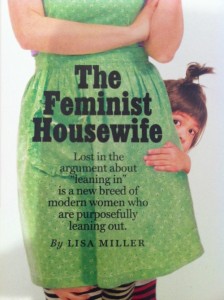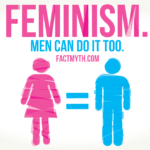Why I want to be a housewife – Libby Ahlers-Diver
Why I want to be a housewife- a feminist point of view
Ladies and gentlemen, my name is Libby Ahlers-Diver. I am a feminist, and when I am older, I want to be a housewife. While this may sound like an oxymoron and an incredibly old-fashioned goal, it is the truth. Many believe that a housewife depicts failing feminism, reverting to the role that women exist only to serve men; and that she belongs in the kitchen. However, I think that all homemakers, male or female and their attitudes show the most significant characteristics of feminism and are incredibly honourable.
The birth of feminism attempted to salvage a woman’s worth by taking them out of the house, and there are many similarities in the attitudes to careers today and the attitudes towards housewives in the ‘50s. In both cases, society’s message to women is that if you fulfil yourself in this particular manner, you’ll be happy. Reality has proven that even women who are CEOs or cabinet members are targets of contempt, needing to fight for their values to be recognised.
Contrary to Betty Frieden’s beliefs, aka the original feminist, I don’t think that being a housewife is the ‘life-restricting, future denying’ prison it was described as. As a housewife, specifically in western democracies such as the UK, you don’t suffer from oppression on a daily basis or from the chauvinism of a boss or colleagues. You determine your timetable and decide what’s important and what isn’t. It is a full-time job to manage and raise a family flawlessly; one that’s ten times harder than any government gig I’m sure -barring Brexit of course. Feminism encapsulates the essence of choice, Something that women in the past did not have the pleasure of. A choice between lifestyles and a choice over your way of life which is not just limited to women. The number of stay at home dads has quadrupled in the last 25years, as their element of choice has also become significantly destigmatised, and, while this is only 16% of the total of stay-at-home parents, it is still a vast improvment.
Conversely, the number of women staying at home has decreased by more than 1 million in the last 20 years, with fewer women wanting to take on the homemaker role to focus on the idealised and promoted career paths. Which a reformed society has ‘sold’ to them as being a necessity to become the very best they can be, and without are concaving into the demands of a patriarchal society. It is incredible that young women are given and taking more opportunities every day, and I fully support each and every one of them.
Even though there are also women, who don’t want and will not have children as it is their choice to decide if they would want to I, personally, even at 18, know that I one day would like to be a mother, though hopefully not quite yet.
So no, not every woman wants to be a homemaker, but it shouldn’t and doesn’t make a woman any less of a fierce feminist if she does.
Of course, there are economic factors that decide the path women take and being a housewife is now, apparently, is only possible for the frivolous rich. However, this stereotype is simply inaccurate. Many women and families cannot afford caretakers or having unemployed parents and consequently, one must stay at home to sustain it and look after the children. For example, one-third of women are currently not only undertaking the role of a homemaker but also are the primary breadwinner for their family, and so having to balance and maintain one of the most demanding but under appreciated lifestyles. Moreover, for many, this is not a choice but rather a situation they usually end up in, be the circumstances divorce, the death of a spouse or unplanned pregnancy for example. To be lucky enough to have the economic stability of a spouse or relative is a privilege, not all have, and cause many women to have to take on the role alone.
The Icelandic women strike of 1975 proved just how valuable homemakers are. Women from around the country gave up working for one day, this including taking care of the children, cooking and cleaning and protested in the capital for gender equality, equal pay and equal representation parliament. Havoc then occurred, Men were left to take care of children they never spent more than a couple of hours a day with, and masses fled to supermarkets to buy sausages as that was the only food they could cook. They struggled, for one day, to combine their work day and domestic tasks. Iceland stopped working because the woman did, and things got messy. Today in
Iceland women fill half the seats in parliament and have achieved one of the best living environments in the world. Not only did they create numerous opportunities for women, but they also showed that homemakers could be the most prominent feminists.
In the 2014 Uk national wellbeing Index, it was said that homemakers were the most likely and highest proportion of people to see life as ‘worthwhile’ while this may not be the beliefs of everyone, it is an essential factor to consider. As a mother, father or homemaker, you are raising the next generation, and it is vital that you raise them with honesty, integrity and morals. There is strong evidence that if there is less time for mothers to interact with their families, due to full-time employment, although there is increased income, it can have negative effects on a child’s wellbeing especially during the early years, and effect later on educational attainment, economic inactivity, mental health and early childbearing.
I don’t want to just become some trophy wife, As an environmentalist and activist, I have my fair share of aspirations I wish to achieve alongside. Homemakers can still work, such as through volunteering or charity work, contributing to society elsewhere, just not in the traditional sense.
The bottom line is, feminism doesn’t come in a one-size-fits-all package. Being a feminist and a housewife is also not mutually exclusive. Whether you’re a homemaker, stripper or a CEO, you can still be a woman who strives for equality for women. So if women can have it all as the feminist creed spells out, then that should include however a woman chooses to get it and make her definition of “all” happen. Thank you















Post Comment
You must be logged in to post a comment.